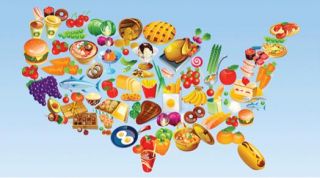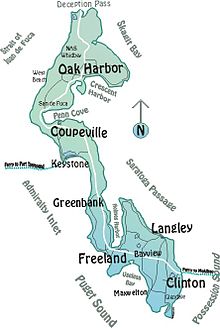Butter, Local Foods, and the French Paradox - Why caring about our food is critical for the future.
 What are the main foods you think of in relation to the American Diet? Sugary drinks, packaged pastries, and fast food, like the chicken nugget, are probably what comes to mind. The main ingredients for this diet, thanks to government subsidies, has fostered an environment where people eat fast food to stretch their dollar. This same environment led to Dr. Eckstein asking the class if it is more expensive to eat locally and prepare your own foods, or to eat out. I was one of the only students to say that it is more cost effective to eat locally, and to prepare your own food; this is probably because I live on Whidbey Island, a foodie's paradise. Specifically, I live on the South End
What are the main foods you think of in relation to the American Diet? Sugary drinks, packaged pastries, and fast food, like the chicken nugget, are probably what comes to mind. The main ingredients for this diet, thanks to government subsidies, has fostered an environment where people eat fast food to stretch their dollar. This same environment led to Dr. Eckstein asking the class if it is more expensive to eat locally and prepare your own foods, or to eat out. I was one of the only students to say that it is more cost effective to eat locally, and to prepare your own food; this is probably because I live on Whidbey Island, a foodie's paradise. Specifically, I live on the South End 
of the island, where there is only one fast food establishment, a Dairy Queen, and this DQ is ridiculously expensive (It costs $10.00 for a chicken strip basket, the least expensive item on the menu is $1.50, for a kids ice cream cone, and the cheapest food item is $3.99). Whidbey has lots of local food, and it is easy to eat food that came from a farm within 10 miles of you. Growing up, it was common to eat lavish meals at home, like wild-caught salmon, lamb, or steak, while spending significantly less money than we would if we ate at the closest fast food joint. So, when my classmates all answered that it is more cost effective to eat out, and eating local was a luxury, it bothered me. This weekend, I discussed the Michael Pollan films with my family, and my Step-Father mentioned that butter was a luxury for him growing up, while margarine was seen as both cheaper and healthier. Of course, we know that Trans Fats, which margarine is loaded with, are exceptionally bad for the human body. In the first Michael Pollan film we watched, he discussed the perils of nutritionism, which is an obsession over finding 'good' and 'evil' nutrients, and the idea that food is just nutrients. Nutritionism created the trans fat problem, which has had a horrible effect on the public health. Finally, the Michael Pollan film mentioned that we should eat more like the French do. He discussed the French Paradox, which essentially describes how the French are healthier than Americans, despite their lavish, high-fat diets. These three topics - Eating Locally, Nutritionism, and the French Paradox - led me to my overarching questions; why is it important to care about what we eat? What does caring about our food look like? I will address these questions through my Whidbey Island upbringing, making a case for butter, and making a case for replacing the "cheap crap" in the Western Diet with higher quality foods in reasonable portions.
 Whidbey Island is an amazing place if you love local, organic produce, and gourmet foods. If you want to purchase locally grown fruits and vegetables for your home, there is a farmers market held almost every day somewhere in Island County. The island is also home to a strong Farm-to-Chef movement, so most of the restaurants around the island have a large number of local foods on the menu. The restaurants on the island are amazing. Whidbey is foodie heaven. Eating local, organic produce is not exclusive to the privileged on the island, by the way. Good Cheer, the local food bank, has partnered with South Whidbey School District to run several gardens, which provide loads of food for people who need a little extra help putting food on the table. In essence, islanders believe that everyone, regardless of income, should have the option to eat healthful food, and no one should go hungry. Why isn't this the attitude of communities everywhere? Also, eating local shouldn't be a luxury that only rural Americans have access to. In fact, the future of eating local lies in the cities. Rooftop gardens are a way to kill two birds with one stone. They help fight food insecurity, and they also act against various environmental issues within the concrete jungle of the city. Hydroponic farming is another important way to fight food insecurity. The Green Bronx Machine, a program discussed in the Michael Pollan film, works to provide healthful food for residents of the South Bronx, through both Hydroponic farming and by taking empty lots and turning them into community gardens. One of the programs that The Green Bronx Machine runs is the JVL Wildcat Academy. This culinary program combines advanced farming technology with a culinary program designed to give high school dropouts a second chance. Programs like this are absolutely crucial for public health, and they have the potential to combat the obesity epidemic by making healthful food accessible to all. One day, you won't need to live in the middle of nowhere to eat locally grown foods, and cooking for yourself will not be an immense challenge.
Whidbey Island is an amazing place if you love local, organic produce, and gourmet foods. If you want to purchase locally grown fruits and vegetables for your home, there is a farmers market held almost every day somewhere in Island County. The island is also home to a strong Farm-to-Chef movement, so most of the restaurants around the island have a large number of local foods on the menu. The restaurants on the island are amazing. Whidbey is foodie heaven. Eating local, organic produce is not exclusive to the privileged on the island, by the way. Good Cheer, the local food bank, has partnered with South Whidbey School District to run several gardens, which provide loads of food for people who need a little extra help putting food on the table. In essence, islanders believe that everyone, regardless of income, should have the option to eat healthful food, and no one should go hungry. Why isn't this the attitude of communities everywhere? Also, eating local shouldn't be a luxury that only rural Americans have access to. In fact, the future of eating local lies in the cities. Rooftop gardens are a way to kill two birds with one stone. They help fight food insecurity, and they also act against various environmental issues within the concrete jungle of the city. Hydroponic farming is another important way to fight food insecurity. The Green Bronx Machine, a program discussed in the Michael Pollan film, works to provide healthful food for residents of the South Bronx, through both Hydroponic farming and by taking empty lots and turning them into community gardens. One of the programs that The Green Bronx Machine runs is the JVL Wildcat Academy. This culinary program combines advanced farming technology with a culinary program designed to give high school dropouts a second chance. Programs like this are absolutely crucial for public health, and they have the potential to combat the obesity epidemic by making healthful food accessible to all. One day, you won't need to live in the middle of nowhere to eat locally grown foods, and cooking for yourself will not be an immense challenge. Perhaps, through introducing healthful foods and providing accessible culinary instruction, Americans will eventually begin eating more like the French do. The French are known for their lavish meals, luxurious cheeses, and culinary expertise. The fact that the French eat these luxurious foods, yet they are in better health, has been described as the French Paradox. The French diet goes against the grain of the nutritionism-laden health claims found in the food industry, and it also fights the idea that quantity is more important than quality. The French Diet is heavily regulated by their culture. Every meal they have is an event, every bite is enjoyed, and they truly care about how their food tastes. They take longer to eat than Americans (They eat for 135 minutes a day, Americans eat for 74 minutes a day, according to "In Defense of Food"), and they also eat in smaller portions. This is significant because it shows one way that caring about your food can lead to better health. Also, the French eat significantly less processed foods, and they feel confident choosing their own foods, which goes against the grain of nutritionism.
 In conclusion, caring about your food is of critical importance to your health, the health of your community, and your enjoyment of food. If you care about eating local, you can support green garden projects in your city. You can also support local farmers by purchasing their products at farmers markets. Eating local shouldn't require lots of money, as the Good Cheer food bank demonstrates, and it shouldn't require living in the middle of nowhere, as programs like The Green Bronx Machine take hold in cities across The United States. If Americans had access to fresh foods, had basic culinary skills, and cared about the flavor of every bite, eating better will be the result. Finally, I believe that combining Michael Pollan's dietary advice (seen above) with the French attitude towards food (If it tastes good, it is good for you) is what caring about our food looks like. It is important because the public health, food security, and the quality of our cuisine hang in the balance.
In conclusion, caring about your food is of critical importance to your health, the health of your community, and your enjoyment of food. If you care about eating local, you can support green garden projects in your city. You can also support local farmers by purchasing their products at farmers markets. Eating local shouldn't require lots of money, as the Good Cheer food bank demonstrates, and it shouldn't require living in the middle of nowhere, as programs like The Green Bronx Machine take hold in cities across The United States. If Americans had access to fresh foods, had basic culinary skills, and cared about the flavor of every bite, eating better will be the result. Finally, I believe that combining Michael Pollan's dietary advice (seen above) with the French attitude towards food (If it tastes good, it is good for you) is what caring about our food looks like. It is important because the public health, food security, and the quality of our cuisine hang in the balance.By Josiah Colby
Word Count: 1,392
Comments
Post a Comment